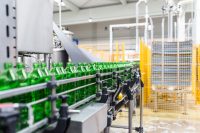Categories
- Additional Insured
- ChildrensProducts
- Claims Made
- Cyber Insurance
- Dietary Supplements and Nutraceuticals
- Ecigarettes
- Firearms Insurance
- Food Products
- Foreign Products Liability
- Foreseeable Misuse
- Frivolous Lawsuits
- General Liability
- Industrial
- Infographics
- Intellectual Property
- Looking ahead
- Marijuana Liability
- Medical Products
- Mutual Indemnification
- Nano Technology
- News
- Online Sellers Insurance Requirements
- Outsourcing
- Piercing The Corporate Veil
- Pollution Liability
- Product liability
- Product Recall
- Retail Chain Store
- Start-Up Business
- Statute of Repose
- Surplus Lines Insurance
- Technology
Manufacturers and Product Liability Claims

Ensuring a proper investigation based on the facts
A product liability claim can ruin your business and your reputation. Whether you, as the manufacturer, are at fault, simply having to defend against claims can be financially devastating.
The widespread and growing use of social media for commercial purposes is a two-edged sword. News about faulty products travels like wildfire among consumers. On the other hand, companies have the ability to get out in front of the story with the facts before the consumer community does it for you with potentially damaging and incorrect information.
It’s important that you recognize the specific potential liability risks of the products your company manufactures, This enable you to address them proactively and create a response plan tailored to the unique risks of your products. Your response plan should take into account the investigation into the claim’s allegations and what you can do to ensure that it is conducted properly.
First things first
Once a product liability claim is made, time is of the essence. Vital evidence can disappear or degrade quickly, witnesses’ memories can fade or be impacted by things they hear or see after the fact. The scene where the event took place can be altered. Immediate documentation of the evidence relating to the product liability is critical. A successful defense in many product liability cases will depend on thee accuracy and reliability of the evidence and witness statements.
Investigating the facts
An investigation will be conducted to gather information and physical evidence. This information is vital to gaining an understanding of what occurred, why it occurred and who is accountable. There are three basic elements of an investigation:
The players
People with expertise in the types of loss in the claim will be part of the investigation team. For example, if your product caused an electrical fire, there will likely be electrical engineering and fire experts examining the evidence. It’s important that you research the credentials of these experts. What they have to say will have a huge bearing on the outcome of the investigation. Beyond their academic and professional credentials, it’s important to know if they are currently active in their field of expertise and stay abreast of the latest research. And can they “dumb down” the science appropriately for a jury if they’re called to testify?
The process
The steps taken in the investigation will differ according to the type of claim (e.g. chemical reaction vs. electrocution). Experts schooled in the latest science aren’t of any value if they’re unfamiliar with the investigative process that’s required for the particular event under investigation. We recommend you apply this same reasoning to your choice of attorney.
The science
Techniques for gathering, studying and analyzing information and evidence are continually evolving. Make sure the experts involved in your investigation are familiar with the latest techniques.
Experts are hired to give offer scientifically sound and reliable information for the court to consider. It’s not unusual for expert testimony to be excluded from the proceedings if it can’t be proven that his or her analysis is being properly applied to the case.
The bottom line
While your Product Liability insurance carrier is responsible for securing evidence, investigating the facts, and analyzing the evidence, it may be in your best interest to hire an expert to sit in on scene and during product investigations to ensure competent management by all the involved parties. Involved parties could be plaintiffs, attorneys, your insurance carrier’s expert and the forensic expert hired to determine the exact cause of the injury.
Source: “Preparing for a Manufacturing Products Liability Claim.” www.travelers.com. April 2017.
-
 Click the Button Below to Get Your
Click the Button Below to Get Your
No-Obligation Quotes from Among the
Top 18 Leading Insurance Carriers Today -
Recent Industry News
- Amazon Sellers and Vendors Strategy Including Insurance Requirements
- Walmart Sellers Insurance
- Product Liability Limit Requirements of Online Sellers
- State-by-State Product Liability Analysis of Laws Impacting Businesses
- Children’s Product Liability: Strange Claims and Need for Insurance
- Product Liability vs. Environmental Insurance for the Chemical Industry
- Product Liability in the 3D Printing Industry: New Materials and Their Significance
- Product Liability Concerns in Agricultural Equipment Enhanced with Artificial Intelligence
- Navigate Product Liability in Battery and Solar Industry
- Cyber Risk Insurance Is Essential Business Insurance in Today’s Modern World
Monthly News Archives
